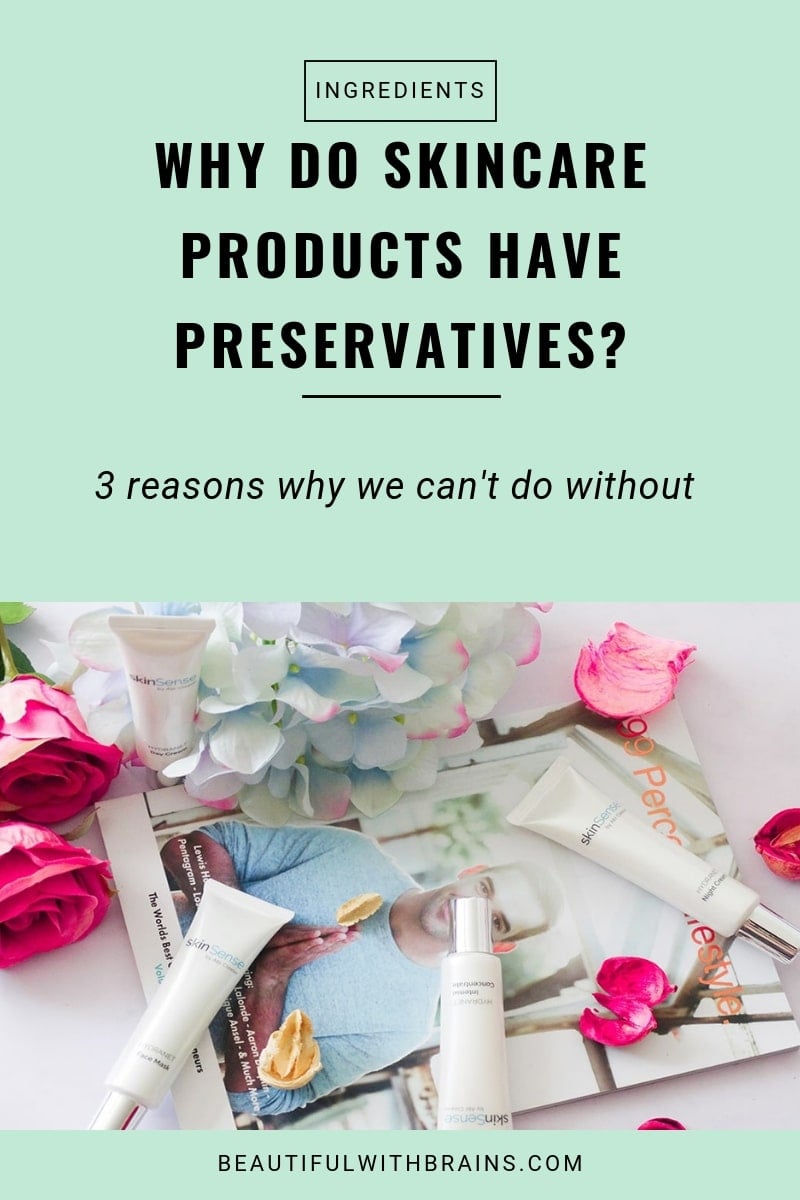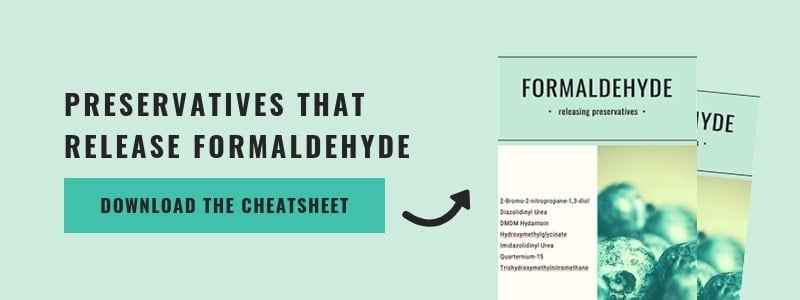
Once upon a time in Skincareland, a group of skincare fanatics gave birth to a natural line of creams and lotions.
They invited all their friends to celebrate. The Antioxidant family was there, with its many children in tow. Mrs Shea Butter was twirling on the dancefloor with her soothing partner, Mr Aloe Vera. The ceramides girls were entertaining their friends with the latest gossips.
Everyone was having a blast.
Then, all of a sudden, the door to the ballroom burst open with a bang. All heads turned in that direction and gasped. The Preservatives clan!
The skincare fanatics had forgotten to invite them. Kinda of on purpose. No one liked those preservative guys. They were harsh. Nasty. Always in your face. What harm could it do leave them out?
“Ladies, gentleman,” DMDM Hydantoin, a preservative that works by releasing toxic formaldehyde, addressed the crowd: “Your new organic, preservative-free lotions and potions should indeed thrive… for a few short months.
“After that time has passed, they will turn into deadly concoctions that will give their users an eye infection, a bad rash, or worse. Goodbye!,” he finished his curse, before turning on his heels and leaving the ballroom with the rest of the gang, leaving everyone else in shock.
Since that day, preservatives have been a necessary evil. Here are 3 reasons why you need preservatives in your skincare products:
Do You Know Some Preservatives Release Formaldehyde?
Sign up to my newsletter and receive the "preservatives that release formaldehyde" cheat sheet.
1. Preservative-free skincare products don’t last long
Ever wondered why traditional creams and lotions can last up to 2 or 3 years while your organic creams go bad within six months? Preservatives. They’re what makes those antioxidants work overtime and prevent formulas from spoiling too soon.
Preservatives slow down the oxidation process. In plain English, all antioxidants go bad overtime. It’s the same with food. Leave half an apple on the counter and a few hours later, the top layer gets darker. That’s oxidation.
Preservatives slow down this reaction, helping your antioxidants stay active and healthy for months – until you’ve had time to finish the bottle. Phew!
Related: The Truth About Natural Preservatives
2. Preservative-free skincare products are easily contaminated
It’s so easy for a solitary bacteria or germ to sneak its way into your skincare potions. You just have to scoop out the product with a dirty finger or accidentally sneeze when you open the jar.
Most of the time, these solitary intruders don’t do any real harm. The preservative gang spots them immediately, gives them a good beating and kills them before they can reproduce and harm you (told you they weren’t the nicest guys, but they’re just trying to keep you safe).
Without them, that solitary bacteria would procreate and give you a bad rash, or worse. Call me selfish, but if one of us must take a beating, I’d rather the bacteria did.
Related: Parabens Alternatives: Which Ones Are Safe And Effective?
3. Preservative-free skincare products need to be stored in refrigerators
Ok, you don’t need to store any products in the refrigerator, but it helps. Think of preservatives-free products like food. The cold temperature helps them last longer.
Problem is, do you have enough space in there to keep both food and cosmetics in? Even if you do, that still won’t make them last as long as preservatives do.
Preservatives are the skincare police. They have to be harsh and menacing sometimes, but they only do it to keep you safe.
P.S. If you have sensitive skin, you may want to avoid preservatives that release formaldehyde (they’re irritating). Click on the image below to download the complete list of formaldehyde-releasing preservatives:
Do You Know Some Preservatives Release Formaldehyde?
Sign up to my newsletter and receive the "preservatives that release formaldehyde" cheat sheet.
Have you ever been seduced by preservatives-free cosmetics? Share your thoughts in the comments below.


once I bought a lipstick and I need to keep in fridge because it can melt. no kidding!
.-= Sherry´s last blog ..SoapayalaSoaps giveaway =-.
Very nice to see you offering up both sides of the argument here. Generally I try to avoid preservatives, but if I spent a lot on something, say if I bought a cream by La Mer or La Prairie for instance, if I knew that didn’t give me a bad reaction BECAUSE of its preservatives, I’d definitely want one with preservatives in it, so that my expensive investment lasted longer and had no chance of going bad.
.-= Anastasia´s last blog ..Addicted to the V =-.
wow, in refridgerators! :S
there should definitely be preservatives in makeup and other products otherwise you wouldnt be able to keep it out of the fridge! which would be.. really bad.
.-= celeste´s last blog ..Een nieuwe trend in beautyland! =-.
Really good post Gio. I remember making a mixing medium and forgot to change it after 3 weeks and it totally went bad. I usually try to look for products that don’t have a large list of ingredients so I would have a lower chance of having any type of allergic reactions.
.-= Dee´s last blog ..Argan Oil For Beautiful Glowing Skin =-.
Really good post Gio. I remember making a mixing medium and forgot to change it after 3 weeks and it totally went bad. I usually try to look for products that don’t have a large list of ingredients so I would have a lower chance of having any type of allergic reactions.
.-= Dee´s last blog ..Argan Oil For Beautiful Glowing Skin =-.
Sorry, forgot to add great post! Can’t wait to see your next post!
Sherry: they really can, specially with this heat! I don’0t know about where you live, but it’s way too hot here!
Anastasia: usually I don’t mind preservatives since they’re used to prolong the shelf lives of products. I don’t want my products to go bad soon, esp if I’ve paid loads of money for them. But I stay away from formaldheyde relasing presevatives. I know they only release formaldehyde in very small quantities but still I’m not comfortable in using them esp when there are much safer alternatives around.
Celeste: yeah, cosmetics are like food, if not stored properly they go bad. I agree, that would be bad, I would probably need one refrigerator just for my makeup lol.
Dee: thanks. I’m always wary of products with very long ingredients list for that reason.
Thank god, a real article on preservatives. I hate this whole parabin panic and natural nonsense. Natural doesn’t necessarily mean better and parabins don’t give you cancer! I can definitely understand the allergy part, though.
When I was dabbing with DYI lotions etc, some people advised me to use vitamin E as a preservative. But if a lotion has water in it, chances are it’s going to get spoiled in some couple of months.
.-= Dao´s last blog ..3 Ways to Rock Your Lip Stains =-.
Danielle: I totally agree with you. I don’t understand the whole paraben scare. Parabens have a history of safe use and because someone twisted the results of a study, people think they’re bad. I can’t stand it when I read a review and the persons like, avoid this because it contains parabens which will give you cancer. How am I supposed to take them seriously when these claimes aren’t based on any scientific studies? The only good reasons not to use products containing parabens is if it causes you an allergy or irritation.
Dao: Vitamin E, which is an antioxidant, can be used as a preservatives. But as all natural preservatives it doesn’t work for long. 🙁